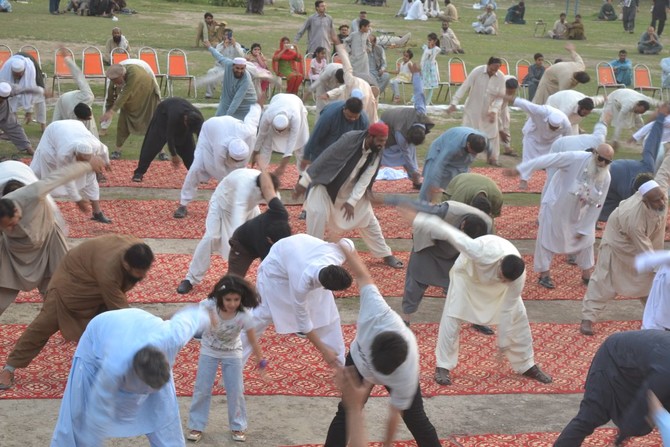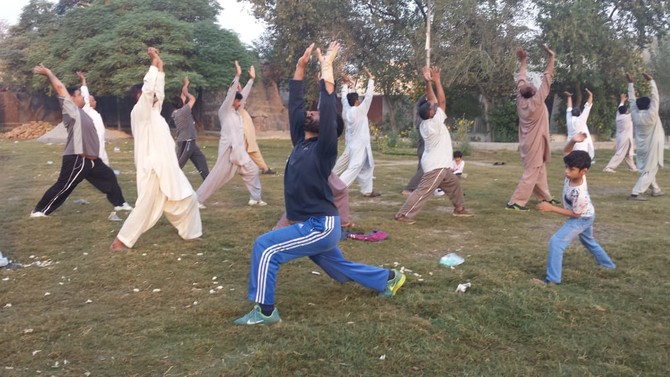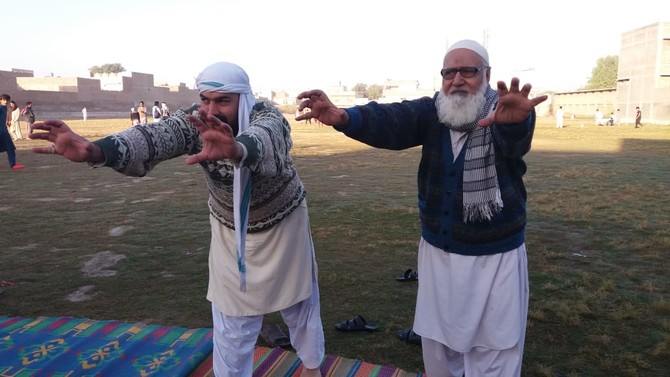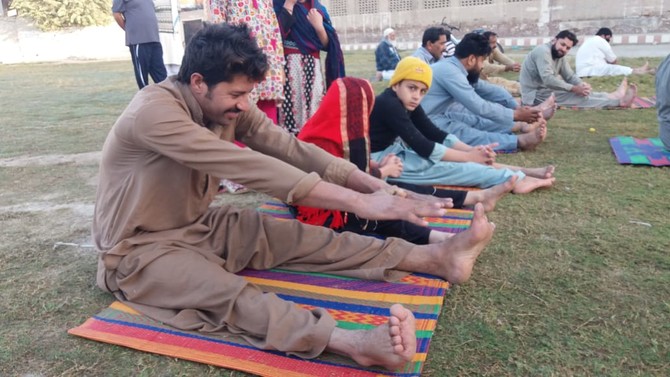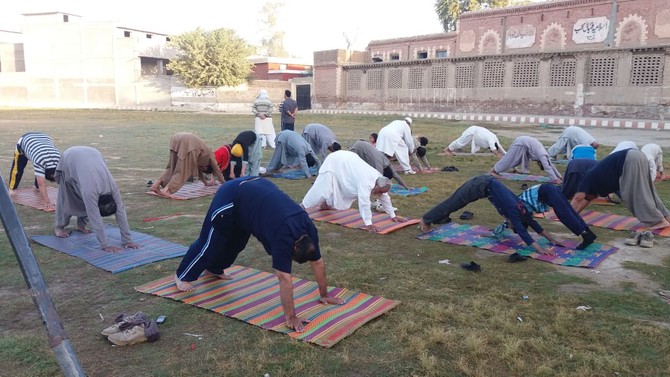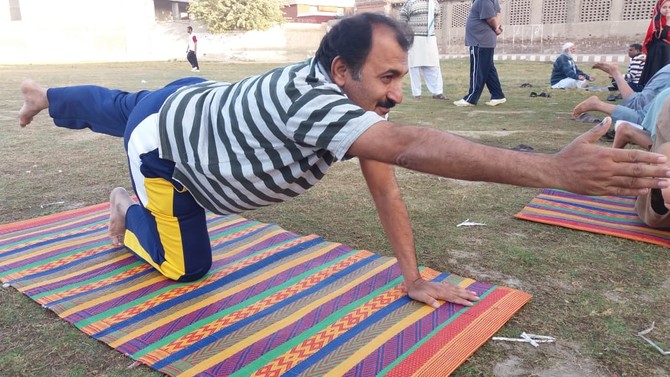DERA ISMAIL KHAN: Seventy-year-old Gulzar Ahmad was walking past a park near his home in the city of D.I. Khan, in Khyber-Pakhtunkhwa, when he heard roars of laughter. A group of men of all ages were laughing as though they had just heard a really good joke. But, Ahmad noticed, no one was telling jokes or even really talking.
“In the beginning I thought they were some crazy people — now I am one of them,” he said.
What Ahmad was witnessing was people indulging in laughter therapy, which aims to reduce stress. It was part of a yoga session, which until recently was something that not many people in the district were familiar with.
If anywhere needs its share of laughs, it is D.I. Khan. Dera Ismail Khan, to give it its full name, is the adjoining district to South Waziristan, which is one of seven tribal districts in Pakistan and shares a border with Afghanistan. Following the US invasion of Afghanistan in 2001, there was a huge influx of refugees in South Waziristan, which spilled over into D.I.Khan.
Subsequent military operations in the region added to the upheaval for residents of the underdeveloped district.
The first yoga group in the city was established at Haq Nawaz Park in 2015 by Mohammed Khalid Ali Zai, a retired military colonel.
“I wanted to do something for my native region, where I was born,” he said. “The people of the city have faced the brunt of terrorism, which spoils their lives.
That’s why I wanted to serve the population and help them keep physically fit.
“The city no longer belongs only to the people of D.I. Khan but also to the adjacent Waziristani people as well. They have been targeted by a plague of militancy for many years, which has destroyed them financially, mentally and psychologically. My dream is to see the public parks full of people and the hospitals empty.”
With people of all ages increasingly falling victim to a variety of skin, eye, stress and anxiety-related diseases, a new yoga and fitness club has opened in the heart of the city to help people stay healthy and overcome any problems. The Town Hall Yoga Club, which is for women only, provides basic fitness training and classes free of charge in the afternoons and evenings.
“Here, the majority of women are housewives and busy with domestic activities,” said Ghazala Shaheen, a yoga instructor at the club. “This is the perfect place where they can come and exercise, which ultimately helps them relieve their stress. Staying at home has made these women the victims of obesity, diabetes, high blood pressure and other diseases.”
She said that that the popularity of the club has grown quickly: “We started with just few ladies but now, after only two weeks, we have about 60. I am hopeful that soon the numbers will rise and we will have to open new centers.”
It’s not only older women who are showing interest in the sessions, but also college and university students.
“D.I. Khan is a small city,” said Sana, a student at Gomal University. “It has few options for going out. We are feeling much better, mentally and physically, since the opening of this yoga center. Its not just a place to practice yoga but a good way to mingle with other people.”
She has also noticed improvements to her health and wellbeing, too. “Before we used to breath through our mouths. Yoga has taught us to close our mouths and inhale through our noses, which is the first step of yoga,” she said, adding that the trainers have shown her how to improve the condition of her body and respiratory system.
Nizamuddin Mehsud, a welfare officer in the city who hails from the Makin subdivision of South Waziristan, said that Yoga sessions had helped him improve his digestive system and lose weight.
“I can feel huge difference in my health,” he said, “I would recommend yoga, especially for elderly people. It’s a very good activity and helps in reducing the pain that our people have been carrying in their heads for more than a decade.”
Shoaib Alizai is a lawyer in D.I. Khan and also works as an instructor at the yoga center.
“I am happy to see more and more people joining the sessions,” he said. “Now we are conducting our sessions twice a day, morning and afternoon. There is no age restriction. Now even kids are joining us, which is very encouraging. We are seeing good results among people with diabetes, obesity and orthopedic problems.”
Doctor Muhammad Waseem Akbar, chairman of the department of media studies at Gomal University, teamed up with Khalid Ali Zai to raise awareness of the benefits of yoga among the people of the city. It was not easy at first to convince people to attend the sessions. Initially, they started practicing yoga in public parks, where they could reach people easily. As the movement gained momentum, at least six yoga centers were established in the city.
“This region had faced a lot of hardships in many ways, be it economic, psychological or financial,” said Akbar. “I felt a lot of stress among the students and that was the triggering point to launch something new for the local community that could eventually help them find peace.
“Our basic aim was attract people who had been suffering from psychiatric and psychological diseases, as those people can contract other diseases in hospitals. Such patients need an alternative place with a good environment where they can exchange their views.”
The war on terror has had a huge impact on the lives of people in the region and it will take time to heal, he added.
“Now the people are coming to us after seeing the effects that Yoga can have on their lives and bodies,” said Akbar.
Yoga trends in D.I. Khan — once a Taliban gateway
Yoga trends in D.I. Khan — once a Taliban gateway

Six dead, 20 injured as passenger bus overturns in southern Pakistan

- Passenger bus was heading from Karachi toward Keenjhar Lake in Thatta district, says rescue service
- One person dead, several injured as another bus overturns in Khairpur district, media reports say
KARACHI: Six people were killed while 20 others were injured when a passenger bus overturned in the southern district of Thatta on Sunday, an emergency rescue service said.
The bus was heading from Pakistan’s southern port city of Karachi toward Keenjhar Lake in Sindh’s Thatta district when the accident occurred. Six people were killed and 20 injured in the accident, Rescue 1122 Sindh service said in a statement.
“The deceased and injured have been shifted to the Civil Hospital Thatta,” the statement said.
In a separate incident, one person died while several others were injured after a passenger bus reportedly overturned on the Gambat National Highway in Sindh’s Khairpur district.
Sindh Home Minister Zia Ul Hassan Lanjar expressed sorrow over the loss of lives in both accidents, a statement from his office said.
“Drivers must not let go of caution while driving,” Lanjar said. “Even a minor mistake can lead to the loss of valuable human lives.”
Road accidents are common in Pakistan, where several roads are in dilapidated condition and drivers often avoid following traffic regulations.
OIC’s COMSTECH invites Gaza universities’ presidents to Islamabad to explore academic continuity

- Gaza universities’ officials stress immediate need for virtual learning platforms, remote laboratory facilities for Palestinians
- COMSTECH, Pakistani private universities have launched program to provide 5,000 scholarships for Palestinian students
ISLAMABAAD: The Organization of Islamic Cooperation’s (OIC) COMSTECH Coordinator General Dr. Iqbal Choudhary on Sunday invited the presidents of major Gaza universities to Islamabad, hoping their visit would lead to solutions for academic continuity in the war-torn area.
The OIC’s Standing Committee on Scientific and Technological Cooperation (COMSTECH) has facilitated Palestinian students in securing higher education amid Israel’s military offensive in Gaza. Israeli strikes in Gaza have killed at least 57,000 people and destroyed hundreds of schools since October 2023, dealing a major blow to the education sector in the area.
Choudhary held a high-level virtual meeting with the presidents of all major universities in Gaza to coordinate a “collective humanitarian and academic response” to the war’s impact on higher education sector in the region, the OIC body said in its press release.
“During the meeting, the Coordinator General extended a formal invitation to Gaza’s university presidents currently outside the region to visit Islamabad,” the statement said.
“The visit aims to foster direct dialogue with key stakeholders and explore collaborative solutions to sustain academic continuity under these extraordinary circumstances.”
Choudhary conveyed his deep concern for the people of Palestine, particularly academics, students, and researchers as Israel’s war rages on.
“The suffering of the people of Gaza is unbearable, yet their resilience is inspiring,” Choudhary was quoted as saying by COMSTECH.
During the meeting, the university representatives gave a presentation highlighting key proposals to facilitate medical training for displaced students, capacity-building for health professionals, access to scientific publishing, and supporting research on the psychological impact of war, COMSTECH said.
“Participants also emphasized the immediate need for virtual learning platforms and remote laboratory facilities as many university campuses have been destroyed,” the statement added.
COMSTECH, in collaboration with the Association of Private Sector Universities of Pakistan (APSUP) and member universities of the COMSTECH Consortium of Excellence, initiated a program in 2021 offering 500 fully funded scholarships and fellowships to Palestinian students.
This number was increased to 5,000 scholarships in 2023. Many Palestinian students have already arrived in Pakistan under this program and are pursuing full-degree programs, while efforts are underway to bring more students to the country.
Pakistan-India ‘World Championship of Legends’ cricket match called off amid tensions

- Match called off hours after India’s Shikhar Dhawan withdrew from fixtures against Pakistan
- WCL features retired, non-contracted players from India, Pakistan, England and other nations
ISLAMABAD: A match between veteran cricket stars from India and Pakistan as part of the “World Championship of Legends (WCL)” tournament was called off on Sunday, the league announced after Indian players withdrew due to political tensions between Islamabad and New Delhi.
Sporting ties between arch-rivals India and Pakistan have remained limited due to political tensions between the two countries. Both countries engaged in the worst fighting between them in decades in May this year before a ceasefire was brokered by Washington on May 10.
The WCL is a T20 tournament approved by the England & Wales Cricket Board (ECB) held in England every year. The WCL features retired and non-contracted players from cricketing giants, including England, India, Pakistan, Australia, West Indies, and South Africa.
In a statement released on its social media accounts, the WCL said it had decided to hold the India-Pakistan match in Birmingham after news that the Pakistan hockey team will be coming to India this year, and witnessing the recent India vs Pakistan under-16 volleyball match in Thailand.
“But maybe in the process, we ended up hurting the feelings of many and stirring emotions,” the WCL’s message read.
“More than that, we unintentionally caused discomfort to our Indian Cricket Legends, who have brought so much glory to the country, and we ended up affecting the brands who supported us purely out of love for the game.”

WCL said it was due to these reasons it had decided to call off the match.
“We sincerely apologize again for hurting the sentiments and hope people will understand that all we ever wanted was to bring a few happy moments to the fans,” it concluded.
The league’s owners include its founder, Indian entrepreneur Harshit Tomar and Bollywood actor Ajay Devgn.
The statement came hours after Indian cricketer Shikhar Dhawan wrote on X that he was withdrawing from India’s WCL matches with Pakistan.
“My country is everything for me and nothing is worth more than that,” he wrote.
The second edition of the WCL started on July 18 in Birmingham and has seen three matches played so far. Pakistan played the opening game of the tournament but Sunday’s clash was going to be India’s first.
Former Indian batter Yuvraj Singh is leading the India side while ex-Pakistan captain Mohammad Hafeez is leading the green shirts.
Pakistan’s GB bans construction of new hotels around lakes, earning praise from environmentalists, residents

- Building new hotels around lakes banned for five years to discourage unregulated constructions, protect natural environment, says official
- Environmentalists stress importance of protecting lakes, noting several in region serve as source of drinking water for Gilgit-Baltistan residents
KHAPLU, Gilgit-Baltistan: Environmental experts, residents and activists have praised the government’s move this week to ban the construction of new hotels around lakes in Pakistan’s northern Gilgit-Baltistan (GB) region for five years, noting it would help protect the area’s natural sites.
Pakistan’s mountainous GB region is home to over 13,000 glaciers, more than any other country apart from the polar regions, as well as picturesque lakes, orchards and mountains. As per the GB Tourism Department, over one million tourists visited the area in 2024.
The rise of tourism in the area has led to the construction of new hotels, which have sparked concerns of increasing pollution, waste, lack of regulation and straining of water and power resources in the area.
A video by foreign vlogger George Buckley in June, showing allegedly untreated sewage being discharged into the region’s picturesque Attabad Lake, went viral on social media. It prompted calls for thorough checks and inspections of hotels in the area.
“Gilgit-Baltistan is becoming a forest of concrete due to the influx of tourism,” Syed Asrar ul Hasnain, an official of GB’s Environmental Protection Authority (EPA), told Arab News over the phone.
“The region was going toward an unregulated type of development. Due to this situation, our department sent a recommendation to the government to ban the issuing of NOCs [no objection certificates] for the new construction of hotels,” he added.
Hasnain vowed that authorities would ensure that hotels that were already functional in the region would also be monitored.
“The main objective behind the ban is the protection of natural beauties and the environment,” he said. “And initially, the ban is for five years.”
Kamal Khan, commissioner for the Baltistan region, said the construction of new hotels near lakes and “environmentally sensitive regions” in all four districts of the Baltistan region has been banned as well.
He stressed that sewerage treatment plants (STPs) should be part of hotels constructed near water bodies.
“[Unfortunately], the operational hotels don’t have STPs in the region,” Khan said. “And after filling the pits, the sewage water is mixed in the water body, and it is hazardous for human life and health.”
Noting that GB has a “fragile environment,” Khan vowed to protect it through such measures.
“We have directed all existing and functional hotels to make STPs in their hotel, if the hotels have a high number of rooms,” the commissioner said. “If they do not implement our order, we will seal the hotels.”
’GOOD OMEN’
Dr. Salaar Ali, head of the Department of Environmental Science at the University of Baltistan, appreciated the government’s move, saying it would help protect the natural environment.
“The lakes are not only a tourist destination, but many like Sadpara Lakes are a source of drinking water for the residents,” Dr. Ali told Arab News.
“And the protection of these lakes and areas should be our priority.”
He also called on authorities to ban the use of motorboats in the region, saying they were responsible for littering in freshwater bodies.
Kiran Qasim, a resident of Gilgit and a journalist, described the ban as a “very effective” measure, saying it would also help mitigate the effects of climate change.
“The construction around natural lakes also disturbs plants, birds and fish, etcetera,” she explained. “Instead of imposing a ban for only five years, the ban should be for a long period.”
Zahoor Ilahi, a social activist from Hunza Valley, said authorities should promote environmentally friendly constructions such as huts.
“On the other side, multi-story buildings are dangerous for our environment,” he said. “And there should be no exception for big investors. Laws should be implemented equally.”
Manzoor Hussain, the president of the Hotel Association of Hunza, described the ban as a “good omen” but echoed the same concern.
“We second this move, but there should be no difference between the rich and the poor,” Hussain said, calling on authorities to seal hotels that don’t meet environmental standards.
“The laws should be implemented to protect the environment, in a real manner, not just to get fame on social media,” Hussain said.
Pakistan issues new flood alert as monsoon death toll climbs to nearly 200

- Official data shows 193 people, among them 93 children, have been killed in rain-related incidents since June 26
- Disaster management authority warns of urban flooding risks in Lahore, Rawalpindi, Multan and other Punjab cities
ISLAMABAD: The National Disaster Management Authority (NDMA) issued a fresh flood alert from July 19-25 this week, as the death toll from heavy rains across Pakistan since late June surged to nearly 200.
According to the NDMA’s latest situation report, 193 people have been killed in total since June 26 in rain-related incidents, which includes 93 children, 64 males and 36 females.
Punjab reported the highest number of deaths, 114, followed by Khyber Pakhtunkhwa (KP) with 40, Sindh 21, Balochistan 16 while Azad Kashmir and Islamabad each reported a single death.
“The National Disaster Management Authority has issued a flood alert due to expected monsoon rains across various parts of the country from today till Friday next,” state broadcaster Radio Pakistan said in a report on Saturday.
The NDMA said intermittent rains are expected in KP with the risk of flooding in rivers Kabul, Swat and Panjkora as well as Kalpani and Bara streams.
It warned of the possibility of flooding and landslides in KP’s Nowshera, Malakand, Swat, Dir and upper mountainous areas during this period.
“Heavy rainfall is expected in Islamabad and various cities of Punjab including Rawalpindi, Lahore, Sialkot, Faisalabad, Multan, Khanewal, Sahiwal, Muzaffargarh, Kot Addu, Taunsa, Rajanpur, Bahawalpur and Rahim Yar Khan,” the report added.
The NDMA also warned of urban flooding risks in Punjab’s Lahore, Rawalpindi, Multan and other cities, saying that the province’s low-lying areas were particularly at risk of being submerged with water.
It said monsoon rains are also expected in Sindh’s Karachi, Hyderabad, Sukkur, Jacobabad, Thatta, Badin, Larkana, Jamshoro, Nawabshah and Mirpurkhas districts.
“Urban flooding may occur in these areas due to rainfall, with the possibility of water accumulation on roads, streets and underpasses,” it added.
Monsoon season brings South Asia 70 to 80 percent of its annual rainfall, arriving in early June in India and late June in Pakistan, and lasting through until September.
The annual rains are vital for agriculture and food security, and the livelihoods of millions of farmers. But increasingly erratic and extreme weather patterns are turning the rains into a destructive force.
In 2022, record-breaking monsoon rains combined with glacial melt submerged nearly a third of Pakistan, killing more than 1,700 people and displacing over 8 million. In May, at least 32 people were killed in severe storms, including strong hailstorms.
Pakistan’s Met Office warned in a press release on July 18 that monsoon currents penetrating Sindh and upper parts of the country are likely to “intensify” in the upper and central parts of the country from July 20.


